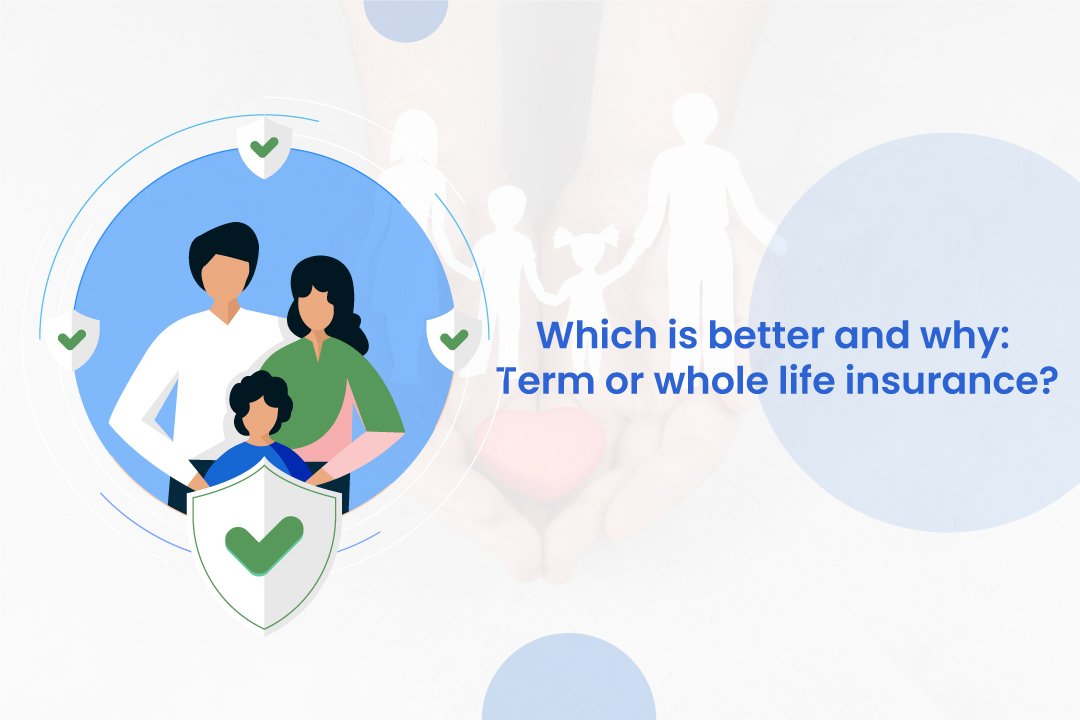

When it comes to life insurance, two popular options are Term life insurance and whole life insurance. Both serve the purpose of providing financial protection for your loved ones in the event of your death. However, they differ significantly in Terms of coverage duration, premiums, cash value, and benefits. This article aims to shed light on the differences between Term and whole life insurance, helping you make an informed decision about the best option for your needs.
Term life insurance provides coverage for a specific Term or period, typically ranging from 10 to 30 years. If the policyholder passes away during the policy Term, the beneficiaries receive the death benefit. If the policyholder survives the Term, the coverage ends, and no benefits are paid out.
Term life insurance generally offers lower premiums compared to whole life insurance. The premiums are based on factors such as the policyholder's age, health, and the chosen Term. Younger and healthier individuals typically enjoy lower premiums, making Term life insurance an affordable option, especially for those seeking temporary coverage.
Term life insurance provides coverage for a specific period. Once the Term ends, the policyholder has the option to renew the policy, convert it into a permanent policy, or let it expire.
Term life insurance policies do not accumulate cash value over time. They are purely designed to provide death benefit protection.
Term life insurance is often suitable for individuals with temporary financial responsibilities, such as paying off a mortgage, providing for children's education, or covering a specific debt. It offers cost-effective coverage during those critical years when financial obligations are higher.
Whole life insurance provides lifelong coverage as long as premiums are paid. It combines a death benefit with a savings component known as cash value. The premiums for whole life insurance are higher compared to Term life insurance due to the lifelong coverage and cash value accumulation.
Whole life insurance premiums remain level throughout the policyholder's life. A portion of each premium payment goes toward the death benefit, while the remainder accumulates as cash value. The cash value grows over time, often at a guaranteed rate set by the insurer.
The cash value in whole life insurance can be accessed during the policyholder's lifetime through policy loans or withdrawals. It can be used for various purposes, such as supplementing retirement income, paying for emergencies, or funding education expenses.
Whole life insurance provides coverage for the entire lifetime of the insured, as long as premiums are paid. This offers peace of mind, knowing that beneficiaries will receive the death benefit regardless of when the policyholder passes away.
Whole life insurance is typically suitable for individuals seeking lifelong coverage and a savings component. It can be an integral part of estate planning, wealth transfer, or creating a legacy for future generations.
Term life insurance is better than whole life insurance depending on individual circumstances and preferences. Term life insurance is generally more affordable and offers coverage for a specific period, making it suitable for those with temporary financial responsibilities. Whole life insurance, on the other hand, provides lifelong
coverage and builds cash value over time. It can be an option for those seeking lifelong protection and potential savings. Ultimately, the choice between the two depends on factors such as budget, coverage needs, and long-Term financial goals. It's important to carefully evaluate your situation and consult with a financial professional to deTermine which option aligns best with your needs.
Selecting the best life insurance policy requires careful consideration of your individual needs and preferences. Here are some key factors to consider when making your decision:
1. Assessing Financial Needs: Consider your financial goals, current responsibilities, and long-Term plans. Evaluate whether you require coverage for a specific period or lifelong protection.
2. Budget and Affordability: Review your budget and deTermine how much you can comfortably allocate towards life insurance premiums. Term life insurance often offers more affordable options, while whole life insurance requires higher premiums due to the additional cash value component.
3. Risk Tolerance and Investment Preferences: Consider your risk tolerance and investment preferences. Whole life insurance provides a guaranteed cash value growth, while Term life insurance focuses solely on providing a death benefit.
4. Consulting with a Financial Advisor: If you find it challenging to decide between Term and whole life insurance, consider consulting with a qualified financial advisor who can assess your unique circumstances and provide personalized guidance.
Understanding the differences between Term life insurance and whole life insurance is crucial in choosing the right policy for your needs. Term life insurance offers temporary coverage with lower premiums, while whole life insurance provides lifelong protection with a cash value component. Consider your financial goals, budget, and risk tolerance to make an informed decision. Remember, both options serve an essential purpose in providing financial security for your loved ones, and selecting the right one depends on your specific circumstances and objectives.